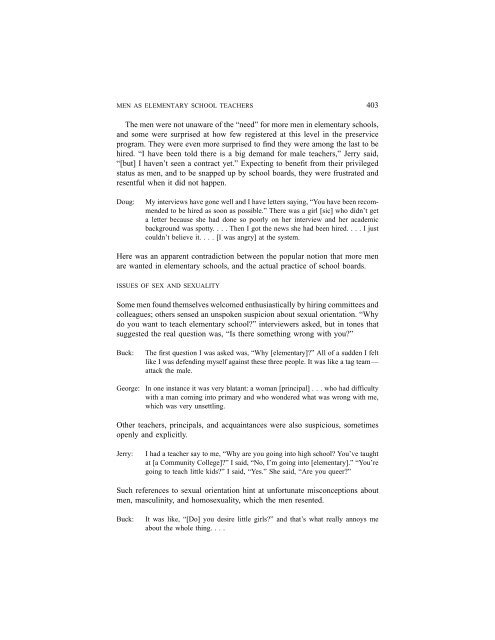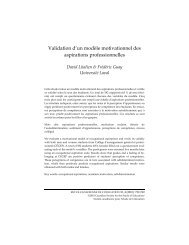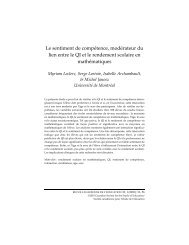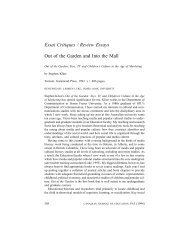Mireille Falardeau et Michel Loranger Le choix de stratégies ... - CSSE
Mireille Falardeau et Michel Loranger Le choix de stratégies ... - CSSE
Mireille Falardeau et Michel Loranger Le choix de stratégies ... - CSSE
Create successful ePaper yourself
Turn your PDF publications into a flip-book with our unique Google optimized e-Paper software.
MEN AS ELEMENTARY SCHOOL TEACHERS 403<br />
The men were not unaware of the “need” for more men in elementary schools,<br />
and some were surprised at how few registered at this level in the preservice<br />
program. They were even more surprised to find they were among the last to be<br />
hired. “I have been told there is a big <strong>de</strong>mand for male teachers,” Jerry said,<br />
“[but] I haven’t seen a contract y<strong>et</strong>.” Expecting to benefit from their privileged<br />
status as men, and to be snapped up by school boards, they were frustrated and<br />
resentful when it did not happen.<br />
Doug: My interviews have gone well and I have l<strong>et</strong>ters saying, “You have been recommen<strong>de</strong>d<br />
to be hired as soon as possible.” There was a girl [sic] who didn’t g<strong>et</strong><br />
a l<strong>et</strong>ter because she had done so poorly on her interview and her aca<strong>de</strong>mic<br />
background was spotty. ...Then I got the news she had been hired. ...Ijust<br />
couldn’t believe it. ...[Iwasangry] at the system.<br />
Here was an apparent contradiction b<strong>et</strong>ween the popular notion that more men<br />
are wanted in elementary schools, and the actual practice of school boards.<br />
ISSUES OF SEX AND SEXUALITY<br />
Some men found themselves welcomed enthusiastically by hiring committees and<br />
colleagues; others sensed an unspoken suspicion about sexual orientation. “Why<br />
do you want to teach elementary school?” interviewers asked, but in tones that<br />
suggested the real question was, “Is there som<strong>et</strong>hing wrong with you?”<br />
Buck: The first question I was asked was, “Why [elementary]?” All of a sud<strong>de</strong>n I felt<br />
like I was <strong>de</strong>fending myself against these three people. It was like a tag team—<br />
attack the male.<br />
George: In one instance it was very blatant: a woman [principal] . . . who had difficulty<br />
with a man coming into primary and who won<strong>de</strong>red what was wrong with me,<br />
which was very uns<strong>et</strong>tling.<br />
Other teachers, principals, and acquaintances were also suspicious, som<strong>et</strong>imes<br />
openly and explicitly.<br />
Jerry: I had a teacher say to me, “Why are you going into high school? You’ve taught<br />
at [a Community College]?” I said, “No, I’m going into [elementary].” “You’re<br />
going to teach little kids?” I said, “Yes.” She said, “Are you queer?”<br />
Such references to sexual orientation hint at unfortunate misconceptions about<br />
men, masculinity, and homosexuality, which the men resented.<br />
Buck: It was like, “[Do] you <strong>de</strong>sire little girls?” and that’s what really annoys me<br />
about the whole thing. ...








